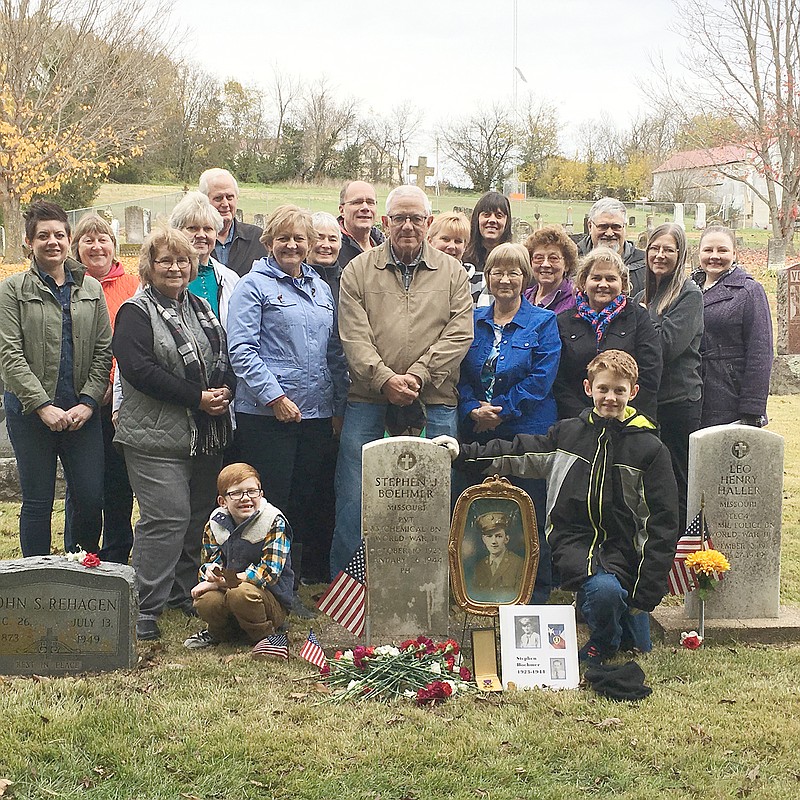The fourth of six children, Stephen Boehmer grew up with an intimate understanding of hardship and hard work. His mother passed away when he was only 5 years old and, when not attending the local one-room Reichel School near the Osage County community of Rich Fountain, he joined his siblings in assisting their father in completing various chores around the family's farm.
As the years passed, Boehmer graduated from Freeburg High School in 1941 and, several weeks later, registered for the military draft with his local draft board in Linn. Returning to his employment at Uncle Willie's Café in Rich Fountain, he became the first of the four Boehmer sons to enter the service when drafted into the U.S. Army at Jefferson Barracks on Feb. 18, 1943.
"His family was very close, I think because of the passing of their mother," said Diane Rackers, one of Boehmer's nieces. "He also wrote home and spoke about having enjoyed attending dances in the Rich Fountain area."
The 19-year-old draftee was sent to Camp Sibert, Alabama, to complete several weeks of basic training. Dedicated on Christmas Day 1942, Camp Sibert became the primary training camp for chemical warfare soldiers during World War II and closed shortly after the end of the war in 1945.
"In June 1943, after three months of basic training, he was sent overseas, headed to North Africa after passing through England," Rackers said.
Following his arrival in North Africa, Boehmer eventually received assignment to Company D, 83rd Chemical Mortar Battalion, who had been in the country since May 11, 1943. A brief period of invasion training ensued, and the young soldier soon entered combat as part of the Allied invasion of Sicily, supporting numerous attacks and counterattacks using such weapons as the 4.2-inch mortar.
Rackers said, "In a letter that was later sent to Stephen's father by Lt. Alfred H. Crenshaw, he wrote, 'Stephen saw many grueling days of combat. Throughout all of this, he acquitted himself in a manner that is a credit to both you and his country.'"
Remaining stalwart in the face of heavy resistance, Allied forces pushed northward into the Italian mainland and were able to secure the port of Naples in addition to vital airfields as part of a nearly three-month campaign named "Operation Avalanche."
In a letter dated Nov. 17, 1943, Boehmer indicated he was "sleeping in foxholes in wet clothes and blankets" with bullets "whistling" above his head. Ten days later, he wrote of another enemy the men of the battalion faced - the weather, with rain falling regularly and creating "an awfully lot of mud."
In his book, "Bastard Battalion: A History of the 83rd Chemical Mortar Battalion in World War II," Terry Lowry notes Daniel Shields, one of Boehmer's fellow Company D soldiers, "said it rained so much he could not stay in his foxhole and eventually sought shelter in a church."
During Christmas of 1943, Boehmer wrote home that he received a welcome respite from combat operations and was able to attend midnight mass while on a five-day pass, during which he had the opportunity to sleep in a bed and watch some films.
The following month, on Jan. 25, 1944, he was one of more than 600 men to board LST 422 - one vessel in a convoy of 13 ships that departed Naples for the Battle of Anzio. Early the next morning, LST 422 encountered inclement weather and high winds, which blew the ship into a known minefield; the resulting explosion caused the ship to break in two and sink off the Italian coast.
"Stephen (Boehmer) was reported missing in action in Italy," Rackers said. "In a letter sent by Lt. Alfred Crenshaw, he explained that Stephen 'was aboard a ship that was destroyed about three miles off the enemy coastline and had to be abandoned.'"
Somberly, Rackers added, "The letter went on to state that the water was very rough and after a 'hard fought contest,' he finally 'succumbed to the overwhelming might of the sea.'"
One of several hundred casualties, Boehmer's body was recovered and was initially interred in the Sicily-Rome American Cemetery in Nettuno, Italy. His remains were returned to the United States in 1949 and reinterred at the Sacred Heart Cemetery in Rich Fountain, the veteran's home parish.
Following his death, Boehmer's three brothers were all drafted into the military because of World War II, surviving their service and returning home to marry and raise children. Decades have since passed since Boehmer lost his life in a violent storm off the Italian coastline; however, his nieces and nephews have found ways to honor the memory of an uncle they never met.
"Stephen was in the military for only 11 months when he gave his life for ours - a deed we must all remember in thought and prayer," said Betty Dickneite, another one of Boehmer's nieces. "That is why we held a special ceremony at his gravesite on Nov. 3, 2018 - 74 years after his death - to present his Purple Heart, Missouri WWII awards and a memorial notebook to his brother's son, Stephen, who was named in his honor."
Stephen's sister, Mary Kay Hager, added, "We know that he will cherish these items and it is our family's hope that they are passed on to his heirs as a remembrance of Stephen Boehmer's sacrifice for the United States of America."
Jeremy P. Amick writes on behalf of the Silver Star Families of America.

